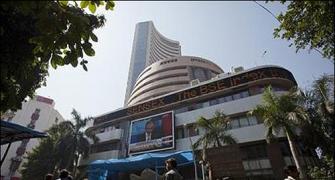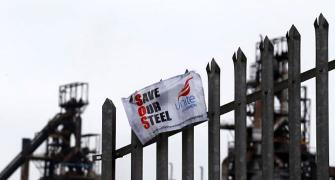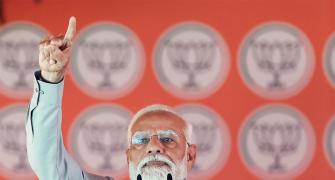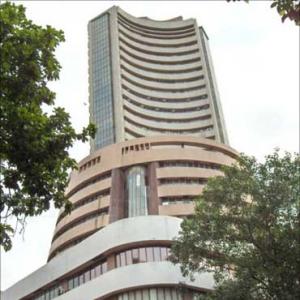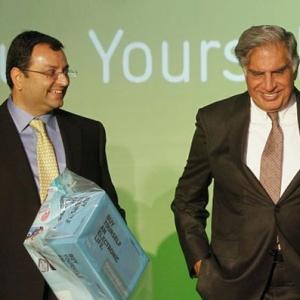During the 11 years ending FY15, Tata Sons cumulatively earned dividend income of around Rs 31,500 crore from TCS.
 Tata Steel UK's financial woes are only one of the many headaches of Tata Sons.
Tata Steel UK's financial woes are only one of the many headaches of Tata Sons.
The Tata Group's holding company has been aggressive in supporting the growth ventures of various companies in the group but the returns from its incremental equity investments in the past decade have been negligible.
The only exception has been Tata Consultancy Services, funding Tata Sons' investment in the group's various listed and unlisted ventures.
In the past 10 years, Tata Sons' equity investment in key listed group companies (excluding TCS) grew at a compounded annual rate (CAGR) of 22 per cent - from Rs 3,183 crore in FY04-05 to Rs 23,237 crore at the end of March 2015.
In comparison, its dividend income from this investment grew at a CAGR of only 5.7 per cent - from Rs 339 crore in FY05 to Rs 591 crore in the past financial year. 
This gives Tata Sons an investment yield of 2.5 per cent (at cost) on its equity investment in the group's listed companies.
The ratios have declined steadily over the years, thanks to the poor profitability of major group companies. But, including TCS, investment yield has shot up to 51 per cent.
Market returns are even poorer. Tata Sons' equity stake in listed companies (excluding TCS) is currently valued at Rs 77,000 crore translating into a dividend yield of 0.7 per cent.
In comparison, the BSE Sensex 30 companies currently offer a dividend yield of 1.5 per cent.
Including TCS, Tata Sons' equity investments in listed companies is valued at Rs 4.4 lakh crore.
In the past 10 years, Tata Sons made incremental capital infusion in many key group companies, and only three out of 13 companies in the sample were self-financed and didn't require equity infusion during the period.
The analysis is based on the investment schedule of Tata Sons as reported in its annual report.
Its dividend income is based on the payouts by various group companies and Tata Sons' fiscal-year end stake in the companies.
The actual dividend income may vary from this estimate to difference in the date of accrual.
For example, Tata Steel's dividend for FY15 will accrue to Tata Sons partly in FY16.
The saviour has been TCS, which accounted for 95 per cent of Tata Sons' dividend income from 14 listed group companies in FY15 - up from 57 per cent in FY05, when TCS reported its first annual results after listing on the bourses.
Tata Sons, however, said its investments in group companies were done with a long-term rationale and financial returns would clearly vary across sectors and across periods of time, and were usually dependent on industry cycles.
"That is why Tata companies are able to pursue sustainable profitable growth over decades - some close to a century - through changing economic and market cycles," a Tata Sons spokesperson said, in a detailed response to a questionnaire. Tata Sons did not comment on questions relating to dividend yield.
The spokesperson said "TCS is an integral part of the group and operated as a division of Tata Sons for nearly 40 years before it got listed. Removing a very successful firm like TCS from the mix, and then comparing our group numbers against say the BSE portfolio would yield an unfair comparison of portfolios."
The spokesperson said even then on a 10 year basis, the market capitalisation of Tata group portfolio minus TCS had grown at 8.4 per cent per annum which exactly matched that of the BSE Sensex.
He also blamed the financial headwinds on external factors and secular industrial slowdown beyond company's control.
"It is also well known that in sectors like power and steel, there have been serious structural challenges in recent years," he said, adding the share price of listed Tata equities such as Titan, TCS, Trent, Tata Motors, and Voltas beat the broader market in the last 10 years.
In the same period, listed Tata equities like Titan, TCS, Trent, Tata Motors, and Voltas grew by 23.9 per cent, 18.1 per cent, 15 per cent, 12.1 per cent, and 10.7 per cent per annum.
"Clearly, our branded plays did significantly better than some of our commodity plays, something in sync with the overall movement of the market," the spokesperson said.
Also, the market capitalisation of Tata group listed entities collectively grew at a CAGR of 13.7 per cent compared to the Sensex growth of 8.4 per cent over a 10 year period; 11 per cent compared to the Sensex growth of 5.4 per cent over a five year period; 15.1 per cent compared to the Sensex growth of 10.4 per cent over a three-year period; and finally, a 6.5 per cent decline compared to the Sensex' decline of 9.4 per cent over a one-year period.
As you can observe, in every time frame, the Tata group portfolio has outperformed the BSE Sensex, Tata Sons said.
Analysts, however, worry about the poor financial health of the majority of Tata listed companies and the group's over-dependence on TCS to fund the growth plans.
Eight out of 14 listed Tata companies in the sample reported either negative or single digit return on equity (RoE) in FY15.
In the last decade, Tata Sons has pumped in Rs 2,000 crore per annum on an average in listed companies and around Rs 1,500 crore in unlisted ventures.
During the same period, the listed companies (ex-TCS) yielded annual dividend income of Rs 650 crore per annum on average.
The gap was filled by TCS, which came from behind to become India's largest dividend paying company in the private sector.
During the 11 years ending FY15, Tata Sons cumulatively earned dividend income of around Rs 31,500 crore from TCS.
This excludes Tata Sons' share of around Rs 6,280 crore from TCS dividend pay-out for FY16.
The differentiated performance has created a huge gap between Tata Sons' equity investment and various companies and their market value.
For Tata Motors, the ratio is 15 per cent (investment) and 8 per cent (value) respectively.
For Indian Hotels, it's 6 per cent and 0.7 per cent, respectively.


